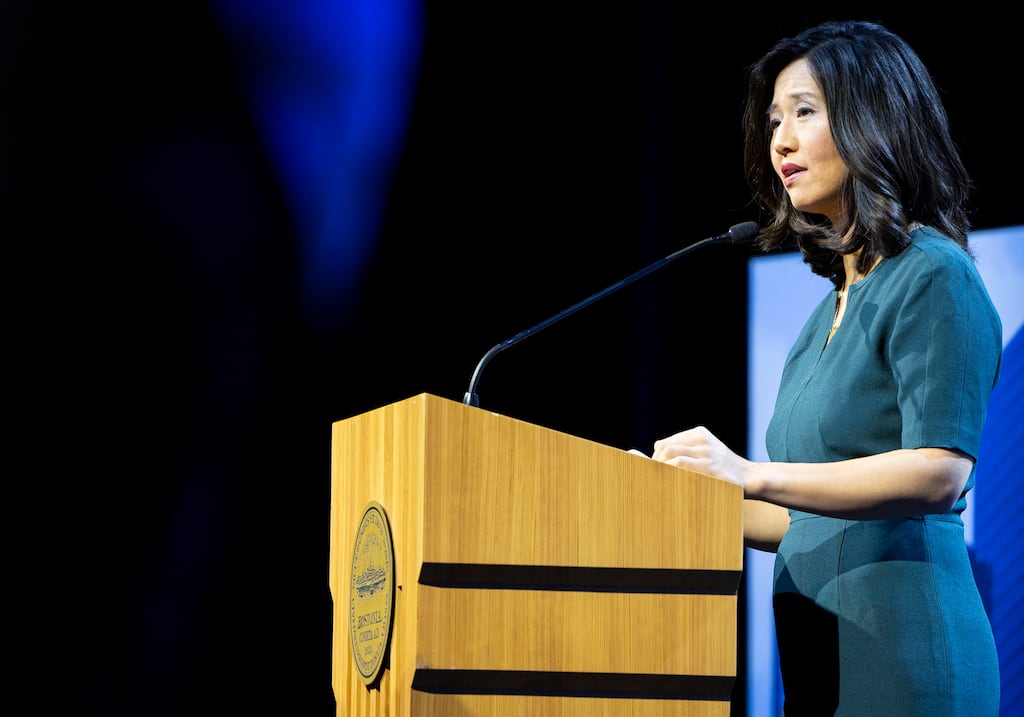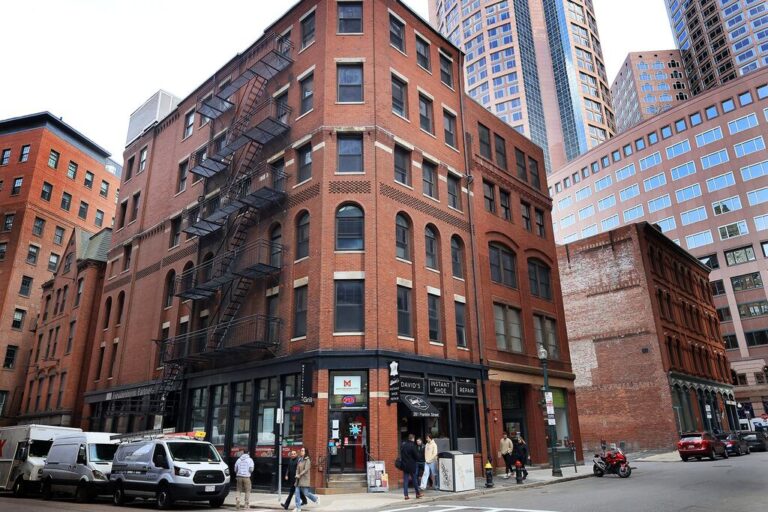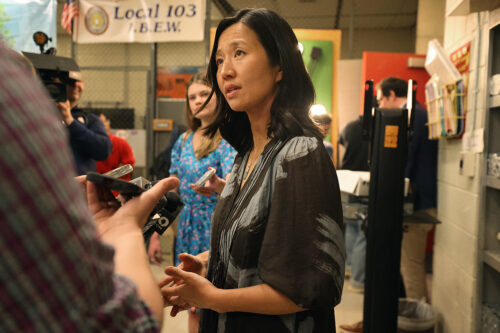Mayor Michelle Wu is hoping dorms might spark more office-to-residential conversions in downtown Boston to help fill up empty buildings and alleviate the city’s housing shortage.
During her State of the City address last week, Wu mentioned she would expand her existing conversion program to include developers that build dorms for students or workers. The general reaction in Boston’s real estate sector: Every little bit helps, especially when construction has begun on only one conversion project so far.
Wu first launched the program in 2023, offering significant property tax breaks over nearly 30 years to developers willing to convert downtown office buildings to apartments. The goal was to rescue older buildings and bring more foot traffic into a part of the city that still hasn’t rebounded to pre-COVID levels, where around one-quarter of the office space remains empty. Last year, the Healey administration pitched in, by promising up to $15 million in state funding for Boston to help jump-start particularly significant conversions.
Want to live in a converted office tower? Boston has high hopes for its high rises.
With the new dorm concept, for college students or “middle income” workers, Wu adds yet another incentive: a way around a city requirement that 20 percent of all housing units in a particular project be set aside at a more affordable cost. This city requirement, known as Inclusionary Zoning, already doesn’t apply to student dorms, and the Wu administration would waive it for developers that build employer-sponsored housing. (The affordable requirement would remain in place for other conversion projects.)
In an interview the day after her speech, Wu explained that the dorm expansion could open up buildings whose footprints wouldn’t quite work for splitting into traditional full-scale apartments but might work for dorms with some shared facilities, such as kitchens or bathrooms.
One scenario that city officials have floated: encouraging developers to bring together multiple smaller schools willing to share a building with each other.
“We’ve had some conversations with smaller colleges and universities who might not have had the scale to do this across the entire building themselves,” Wu said, “but would be interested in joining together with others in a consortium that would together master-lease a building from a private developer.”
Although only one project has begun, a conversion to build 15 apartments at 281 Franklin St., Wu and others in her administration say they consider the program to be a success so far. They point to the fact that 15 applications have been filed, with the potential to convert 20 office buildings into nearly 800 housing units. Seven of the applicants have been approved by the Boston Planning & Development Agency board, giving the green light for more than 350 units; city officials expect up to 200 units to be under construction by sometime this summer.
“Our goal has been to do everything possible to drive the commercial vacancy rate down, and to boost more housing throughout the city,” Wu said. “This program does both. [But] it really takes a unique combination of factors to make this work between the financial status of the building, the valuation of it, the vacancy rates, and also the physical layout.”

A city spokesperson said the state has already made $7.5 million available of the $15 million promised to the city of Boston for subsidizing conversions, though none of that has been awarded yet. City officials, she said, are also willing to consider including conversions in the program that are outside the core downtown area.
Suffolk University’s conversion of an 11-story office building on Tremont Street, with the Beantown Pub on the ground floor, gets widely cited as an example of how some older structures could be repurposed under the expanded conversion program. That project is underway, although the pub isn’t going anywhere. Suffolk is not participating in the city’s program because the university wasn’t interested in a master-lease arrangement and preferred to buy the building on its own. (As a nonprofit, the university doesn’t pay property taxes on dorms.)
BPDA approves Suffolk University’s proposal to convert Beantown Pub building into dorms
Business groups, including the Greater Boston Chamber of Commerce and developer association NAIOP Massachusetts, expressed cautious optimism about the program’s expansion. To Michael Nichols and the organization he leads, the Downtown Boston Alliance, the embrace of college and workforce dorms fits with his group’s view that city officials should take an “an office-to-everything” approach to repurposing these underused buildings — that is, not just turning them into luxury apartments.
Several factors get cited for why Boston has lagged other major US cities in office-to-residential conversions lately. They include high construction and property costs along with the city’s aggressive affordable housing and clean-energy requirements. A new downtown zoning change under consideration at City Hall could usher in more units, by allowing taller buildings in certain areas.
Bryan Montgomery, a researcher with brokerage giant JLL, said some of these projects probably haven’t started because their costs changed materially during the permitting process. After six to 12 months go by, the math may no longer add up.
“They’ve tried their best to expedite the permitting,” Montgomery said. “[But] it’s a fine line between actually putting these programs in place and making them streamlined in a way that allows folks to act with conviction.”
Developer Joey Chilelli has been watching the process unfold from New York. His firm, Vanbarton Group, has already been involved in several big conversions in its home city, and he has been eyeing an expansion to Boston. The prices for downtown buildings in Boston, he said, simply haven’t fallen far enough for projects to pencil out for him yet. He said it’s smart for Boston officials to expand the program, potentially to create housing for university faculty or another sector that needs to accommodate its workforce.
“I do believe we will start to see a lot more of these” conversions in Boston, Chilelli said. “I feel like it’s on the cusp.”
Synergy chief executive David Greaney, whose firm owns several downtown Boston buildings, said the affordable housing requirement makes it tougher to make the numbers work. Wu’s expansion, at least, offers a workaround.
“That is a step in the right direction,” Greaney said, “and may help deals pencil out better than they are currently penciling out.”
Take a look at the big redevelopment plans for Brookline Avenue in LongwoodDowntown Boston office tower One Lincoln fetches $400 million at sidewalk auctionCity plan to allow 500-foot skyscrapers in Downtown Crossing hits the brakes after pushback


Comment count: